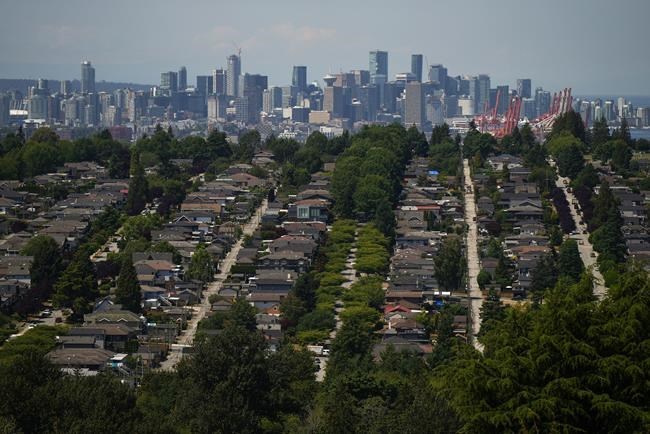
The downtown Vancouver skyline is seen in the distance beyond houses in Burnaby, B.C., on Wednesday, July 12, 2023. A report led by the Canada Research Chair in Urban Governance, David Wachsmuth, says clampdowns on short-term rentals in British Columbia have reduced rents by 5.7 per cent, saving tenants more than $600 million last year. THE CANADIAN PRESS/Darryl Dyck
Republished September 20, 2024 - 9:36 AM
Original Publication Date September 18, 2024 - 11:46 AM
VANCOUVER - Crackdowns on short-term rentals in British Columbia have effectively reduced rents by 5.7 per cent, saving tenants more than $600 million last year, says a report led by the Canada Research Chair in Urban Governance at McGill University.
That figure is the result of municipal restrictions, in particular requirements that short-term rental units must be located within the operator's principal residence.
In Vancouver, for example, the report says renters are paying an average of $147 less each month than they would have without the city's principal residence rule.
The report, led by research chair David Wachsmuth, says the recent provincewide regulation for communities with more than 10,000 residents has the power to carry similar savings across B.C., helping to ease affordability challenges.
The provincial change took effect in May, requiring listings on platforms such as Airbnb and Vrbo to be located in the operator's principal residence and one secondary suite.
Assuming the provincewide requirements have the same efficacy as existing municipal rules, Wachsmuth's report says tenants in those cities should see rents decline by four per cent, amounting to a total savings of $592 million each year by 2027.
Renters would pay an extra $1 billion within two years if the province's rules were to be repealed after this year, says the report released Wednesday.
That's a finding Premier David Eby's New Democrats are highlighting in a statement a month before B.C.'s election, saying provincial Conservative Leader John Rustad recently told supporters he would reverse the short-term rental restrictions.
The report says the BC Hotel Association commissioned the researchers to provide an early analysis of the province's short-term rental rules. The authors are exclusively responsible for all of the analysis, findings and conclusions, it adds.
The researchers looked at 52 of 55 neighbourhoods across B.C. with a principal residence restriction in place in January 2023. The analysis found rents were an average of $110 lower than they would have been without the rule.
B.C. passed its provincewide short-term rental accommodations law in October 2023 and the government has been phasing in the measures.
Wachsmuth's report report says a registration system with additional "accountability requirements" for listing platforms is expected early next year.
It says the "full implications" of B.C.'s rules won't become clear until then, when the platforms will be obligated to remove listings without valid licences.
But the report concludes that B.C.'s principal residence restrictions mean average monthly rents will be $94 lower in the fall of 2027 than they otherwise would have been.
The researchers also looked at the number of Airbnb listings before and after the province's principal residence requirement took effect in May.
They found 13,624 "frequently rented entire homes" in B.C. listed on the platform in June 2023, along with a further 34,665 different kinds of properties.
Of the frequently rented homes, the report says just over 86 per cent were still visible by July 2024. Close to 89 per cent of the other listings were also still visible.
"In general, the more active the listing, the lower chance it was still visible on Airbnb after May 2024," the report notes.
The report says the researchers used public and private data sources to conduct their analysis, as well as a modelling approach that's widely used by economists.
This report by The Canadian Press was first published Sept. 18, 2024.
Note to readers: This is a corrected story. A previous version referred to the "McGill report." In fact, while the report was produced by researchers based at McGill, it was not by or for the university.
News from © The Canadian Press, 2024